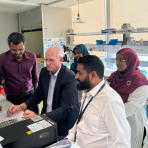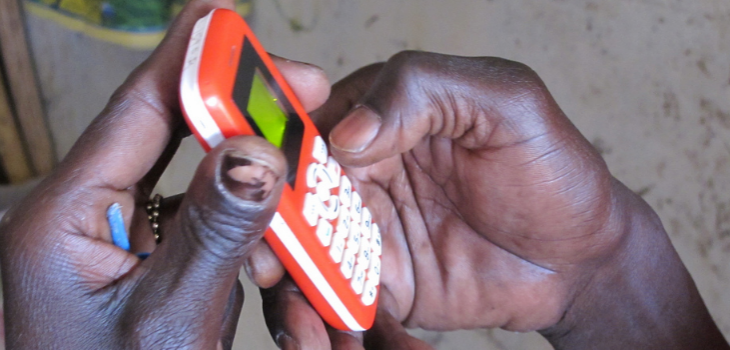By Katie Hampshire (Durham University)
This wasn’t a paper I’d been intending to write – rather, it demanded to be written in Health Policy and Planning. We had been working for the last three years on an ESRC/DFID-funded project researching the impacts of mobile phone use on young people’s lives in Ghana, Malawi and South Africa. From our interviews and surveys with more than 4500 young people across the three countries, it became clear that young people were using phones creatively and strategically to try to overcome the day-to-day difficulties they faced in getting access to education, employment and healthcare, etc. (see here). Specifically, in the absence of ‘formal’ mhealth programmes, young people were taking the initiative to use mobile phones to obtain health information, advice and care, although doing so was not always easy or without risk.
But it was not only young people who were doing mhealth informally – health workers were too. We interviewed a small number of health workers in our study settlements (alongside other ‘key informants’) to get their perspectives on the situation. We were struck by their accounts, especially those working at community level, of using personal mobile phones on a daily basis to support their activities. Indeed, mobile phones have become more or less indispensable for most health workers, who use them to arrange patient follow-up, liaise with colleagues, organise community outreach and manage logistics, as well as to secure help in emergencies. As one rural health-worker in Ghana told us, “If my phone goes off, my whole world comes to an end because I cannot communicate with my colleagues and patients.” And all of this was happening in the absence of any ‘official’ mhealth initiatives.
But here’s the rub: that rural health worker we spoke with in Ghana – and all the others we interviewed – were having to meet the costs of mobile phone use themselves. They had to purchase their own phones (and replace them when lost or broken), buy credit and keep the battery charged. For a hospital consultant, that might not be such a problem, but for community health workers (CHWs) on minimal stipends, serving rural areas without electricity, it could represent a serious challenge.
Many reported making significant sacrifices in order to buy phone credit, particularly in Malawi where airtime is particularly expensive relative to incomes. Yet such is the moral imperative to care that health workers felt obliged to meet these costs, even at the expense of other necessities. A Malawian Health Surveillance Assistant (HSA), for example, told us that he used his own airtime to phone mothers with their infants’ HIV test results because he would feel “sorry and guilty to delay the results to the mothers”, while a Community Health Nurse in Ghana said, “as a human being you can’t just watch somebody dying just because you don’t use your mobile phone to call for assistance.”
It seems grossly unfair that, in a world where income inequalities are so marked, it should be the lowest paid that shoulder the financial burden of ‘informal mhealth’. Why are the poor required effectively to subsidise community healthcare and not higher-ranking professionals? Malawian HSAs earn just US$100/month, and Village Health Committee volunteers, many of whom are required to use their phones on a daily basis, receive no stipend at all. The World Health Organisation’s promotion of ‘task shifting’ (‘the rational redistribution of tasks among health workforce teams [. . .] from highly qualified health-workers to health-workers with shorter training and fewer qualifications’)– has attracted criticism from commentators who point to the unfairness of shifting the (financial/time) burden of healthcare towards the lower-paid. ‘Informal mhealth’ appears to be an extension of this. While formal mhealth has been widely promoted as an efficient and “cost saving” way to deliver healthcare, especially to rural and other hard-to-reach communities, informal mhealth may be more about cost shifting.
Our study is far from definitive; it was an unintentional spin-off from a larger project and the sample was small and semi-opportunistic. But we believe that there is something important here that needs further investigation. Research and critical analysis is essential in other contexts where informal mhealth is emerging as a serious phenomenon, if we are to capitalise on its potential benefits without making unreasonable demands on health workers and perhaps further entrenching social and economic inequalities. This research must both engage closely with individual experiences and interrogate more profoundly the taken-for-granted neoliberal assumptions about ‘efficiency’ and public/private responsibility.
Research must then feed urgently into policy and practice across the many low- and middle-income countries where the scale-up of CHWs is a key plank of achieving universal healthcare access. Addressing the issue will need careful consultation, planning and monitoring, and solutions will need to take into account the social, economic and political contexts of each country, but providing basic equipment (phones, solar chargers), airtime and/or allowances to CHWs seems worth considering. Clearly there are cost implications but, as Maes et al have pointed out, the cost of paying 50,000 CHWs is roughly on a par with the cost of employing a dozen expatriate development officials (who could perhaps be asked instead to volunteer their time for free…). Next to this, a CHW phone allowance to enable the expansion of community healthcare, without exacerbating inequality and exploitation, is small change…
Kate Hampshire is a Reader in Anthropology. She is a medical anthropologist and has been conducting fieldwork on health and well-being, mostly in Sub-Saharan Africa, since the mid-1990s.
Image credit: Simon Berry











